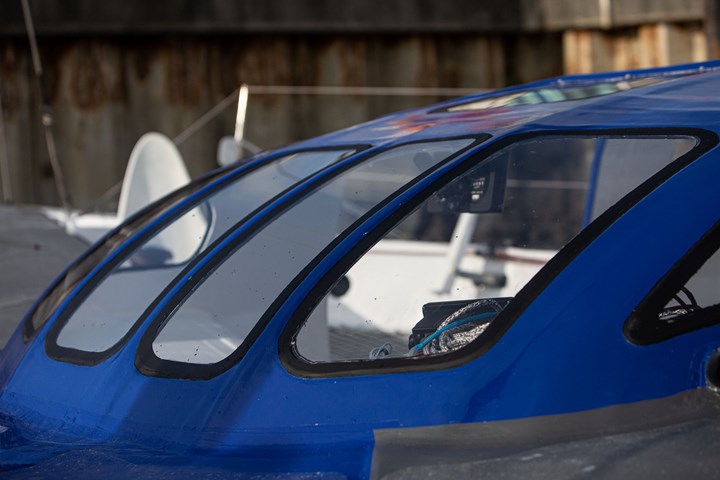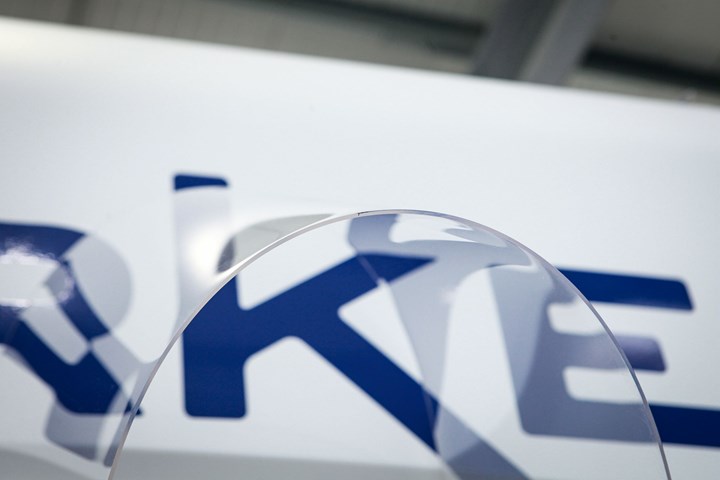Materials: First Flexible Acrylic Sheet Debuts on Arkema 4 Trimaran
Altuglas’s ShieldUp Flex flexible acrylic sheet is a major innovation in the world of transparent flexible plastic.
The first flexible acrylic sheet has made its appearance as the glazings (roof and cockpit) on famed sailing shipbuilder and skipper Lalou Roucayrol’s new trimaran, Arkema 4. ShieldUp Flex sheet can be bent manually, without any thermoforming--a technical breakthrough that saves time and money in the design of 2D curved pieces or others that demand flexible material.

Said to represent a major innovation in the world of transparent flexible plastic, ShieldUp Flex acrylic was invented by the research team at the French Lacq Research Center of Altuglas International, subsidiary of Arkema Group (U.S. office in King Of Prussia, Penn.) The team managed to overcome a key technological hurdle of PMMA, previously known for its rigidity. ShieldUp Flex sheet has been made flexible, without adding any plasticizers and without altering its properties. Additionally, the flexible acrylic material is extremely chemical and impact resistant, making this patented innovation the ideal solution for projects that require transparency, durability, lightweight, shock resistance and flexibility
Roucayrol, the shipbuilder of the Arkema 4, the Arkema group’s new Multi50-class trimaran, was specifically looking for this unprecedented combination of benefits for the boat’s glazings:
▪ Perfect visibility and very strong shock resistance under extreme weather conditions, to enhance skipper safety
▪ A significant weight reduction, to further the constant pursuit of improved boat performance levels, thanks to the use of a thinner sheet
▪ Easy window installation. ShieldUpFlex sheet satisfied all of those expectations, in particular its implementation: simplified processing through the complete elimination of the thermoforming step. This allowed the designers to manually bend the cut sheet to the desired dimensions and glue it directly to the boat.

Said Lalou, “ShieldUp Flex was THE product we’d been waiting for: reduced weight, better resistance and, above all, flexible implementation without the need for a long and painstaking thermoforming phase. Thank you Flex!”
Over and above its easy implementation, the new flexible acrylic sheet also opens up new design possibilities for 2D curved pieces. Expect to find it used in traditional PMMA applications like vehicle glazings ( e.g., RVs, boats, cars, motorcycles), but also in industrial glazings, signage, lighting, interior architecture and design, as well as COVID-secure protective screens. There is no doubt that this kind of innovation will pave the way for new applications, be they in electronics such as smart object screens or personal protective equipment, a field that is more relevant today.
Related Content
-
Part 3: The World of Molding Thermosets
Thermosets were the prevalent material in the early history of plastics, but were soon overtaken by thermoplastics in injection molding applications.
-
First Quarter Looks Mostly Flat for Resin Prices
Temporary upward blips don't indicate any sustained movement in the near term.
-
The Effects of Stress on Polymers
Previously we have discussed the effects of temperature and time on the long-term behavior of polymers. Now let's take a look at stress.








